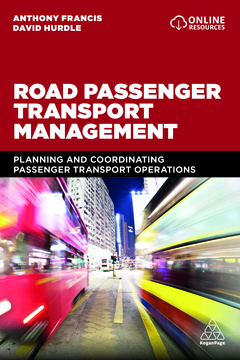Description
Road Passenger Transport Management : Planning and Coordinating Passenger Transport Operations
Planning and Coordinating Passenger Transport Operations
Authors: Francis Anthony, Hurdle David
Language: English
Subject for Road Passenger Transport Management : Planning and...:
Approximative price 66.43 €
In Print (Delivery period: 15 days).
Add to cart
Publication date: 09-2020
288 p. · 15.5x23.3 cm · Paperback
288 p. · 15.5x23.3 cm · Paperback
Description
/li>Contents
/li>Biography
/li>Comment
/li>
Road passenger transport management is an important role, involving the planning and coordinating of passenger transport operations, including routes and schedules. Managers ensure that passengers reach their destinations safely, on time and in the most cost-effective way.Road Passenger Transport Management covers all the essential tasks a transport manager is expected to master. Road Passenger Transport Managementprovides tips and tools for working with customers, planning routes and scheduling delivery times, as well as managing a team of supervisors, administration staff and drivers. The authors include guidelines for coordinating staff training and arranging vehicle maintenance, MOTs and tax payments, as well as organizing vehicle replacements and managing contracts and developing new business. This is a contributed book, with expertise shared from well-known academics and practitioners who have spent many years in the passenger transport field. The tools and case studies in this vital new guide will enable readers to learn new skills or build on existing expertise. Online supporting resources include sample performance reports and target assessment forms.
<ul style='padding-top:0;padding-left:0;list-style:none;'><li><ul style='padding-top:0;list-style:none;'><li>Chapter - 01: Definition (bus, coach, light rail, taxi, demand responsive, community transport);</li><li>Chapter - 02: History and heritage and how that has shaped the business;</li><li>Chapter - 03: Its purpose and importance (objective);</li><li>Chapter - 04: The market for public transport and its relationship with Society and other transport modes, plus land use and planning;</li><li>Chapter - 05: Commercial considerations, fares & charges, other income sources, and sensitivity to market changes;</li><li>Chapter - 06: Business responsibilities;</li><li>Chapter - 07: Relationships with other transport modes;</li><li>Chapter - 08: Legal framework in relationships, government bodies, other stakeholders;</li><li>Chapter - 09: Planning – Research, consultation, business case, options, route planning, scheduling in depot locations;</li><li>Chapter - 10: Operations (forward planning and immediate day-to-day);</li><li>Chapter - 11: Human resources (recruitment, training, retention, career development);</li><li>Chapter - 12: The future – AI – Keep watching the horizon;</li><li>Chapter - 13: Case studies to highlight best and perhaps not so best practices</li></ul></li></ul>
Anthony Francis is a consultant providing guidance on operating and commercial issues affecting the road, rail and aviation transport industries to passenger transport companies. He previously worked in senior strategic roles for the Department of Transport, the Strategic Rail Authority and Arriva. David Hurdle is an independent transport consultant and a transport and town planner. He has written and spoken extensively on sustainable transport issues. He has worked for local government and the public transport industry.
Essential guide to cost-effective, sustainable road passenger transport management
© 2024 LAVOISIER S.A.S.




